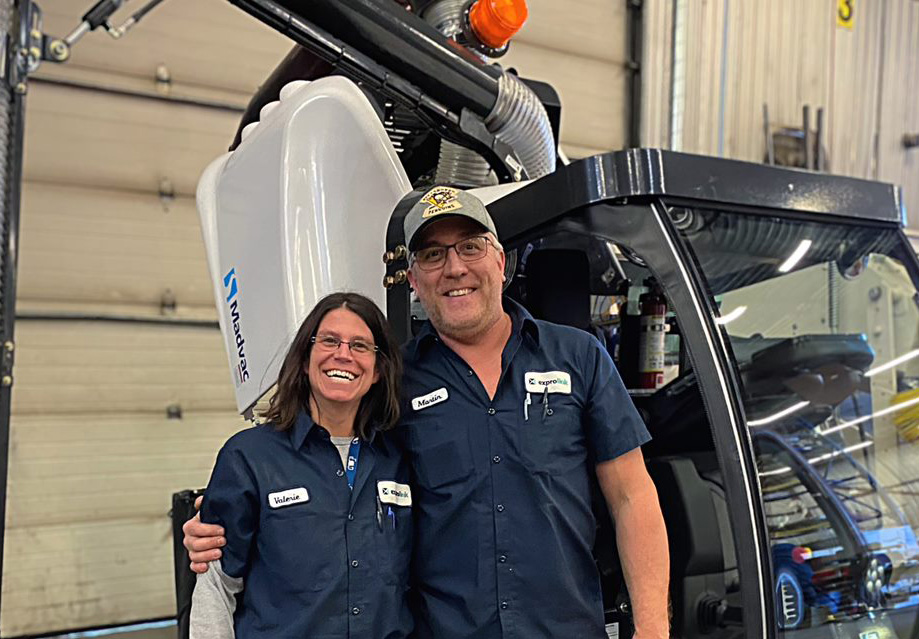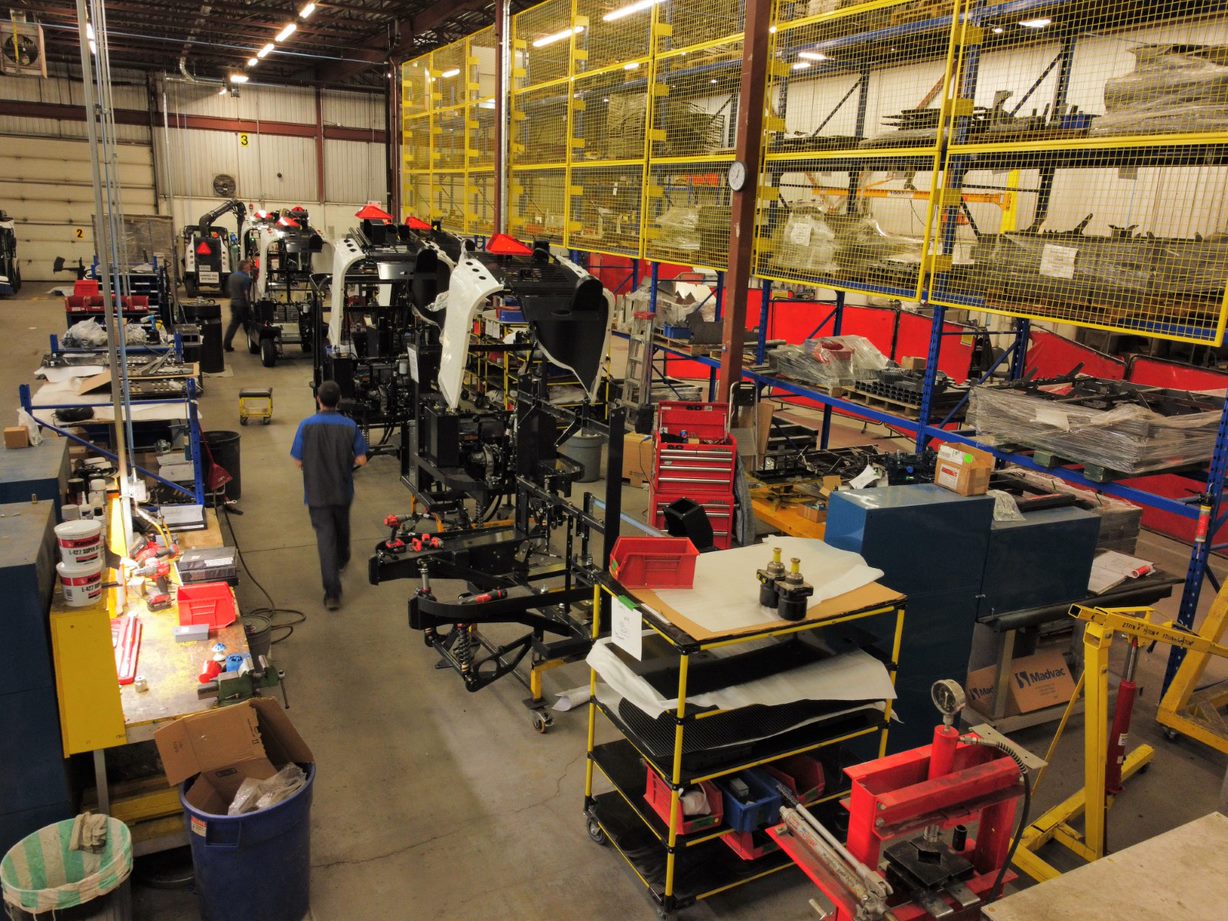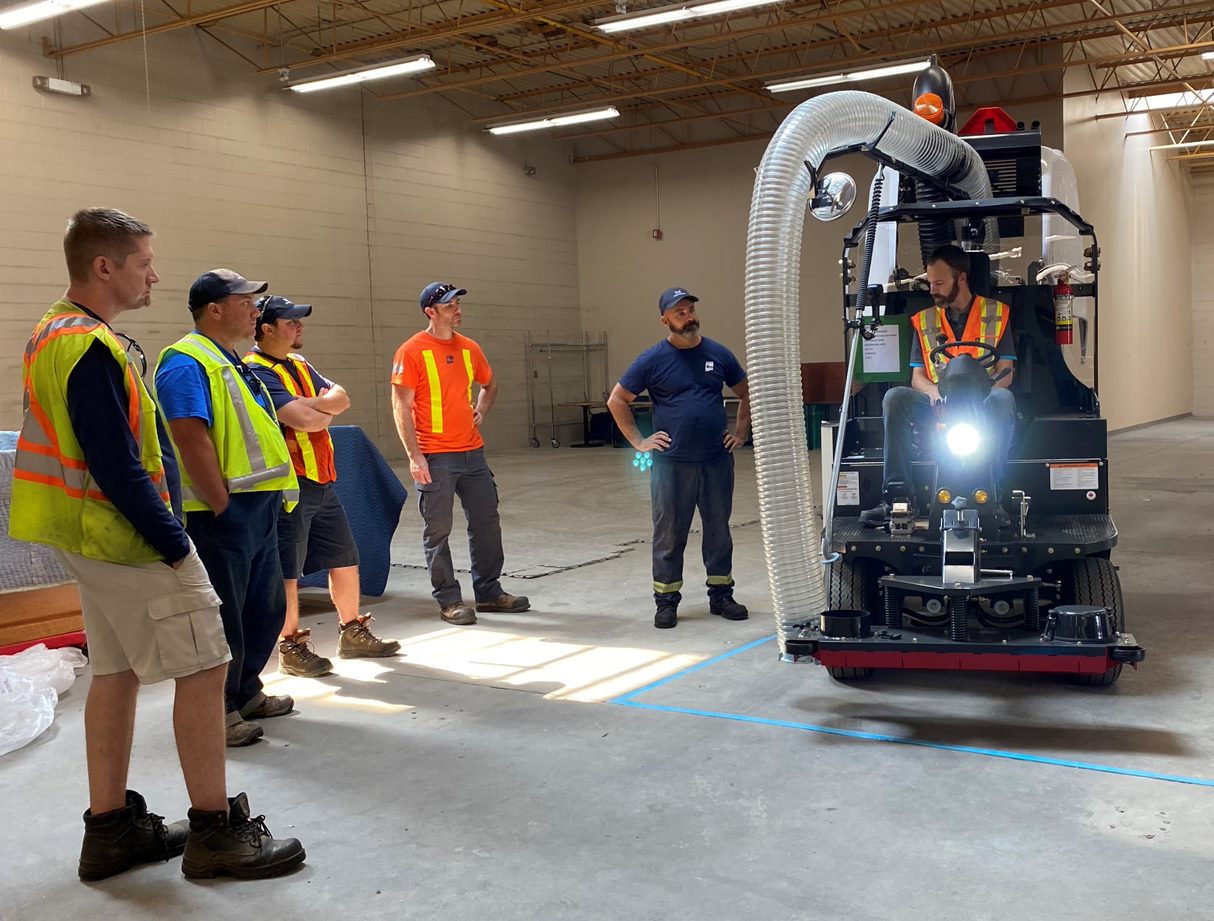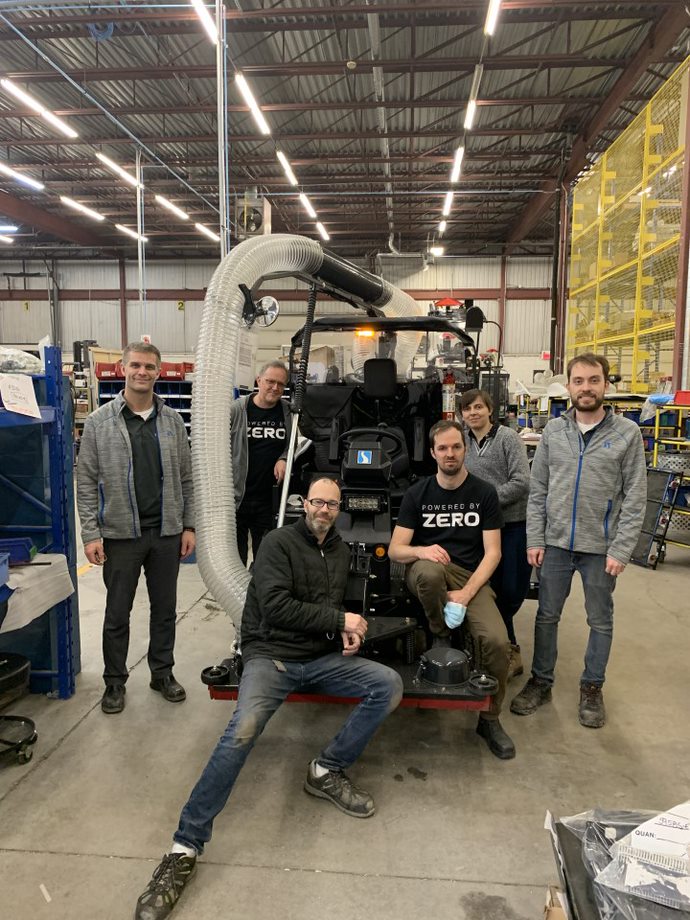
Exprolink: Converting traditional vehicles into electric vehicles
With CED's help, Exprolink is on its way to electrifying its entire fleet of light utility vehicles.
From: CED - June 7, 2023
Summary |
|---|
| Organization: Exprolink Number of employees: 45 Region: Montérégie Program: Quebec Economic Development Program (QEDP) The financial assistance granted has made it possible: to develop a prototype of a compact sweeper with an electric motor and implement a marketing strategy in the United States. |
Transcription
A green sign decorated with vibrant logos announces the title of the video, CED x Exprolink.
Louis-Martin Durand: “Exprolink manufactures outdoor urban cleaning equipment. Our business has 45 employees, and we export over 70% of our production.
In 2017, we began our shift to electric, but it is not quite so simple. The main challenges facing an SME such as ours include, first of all, funding.”
An engineer draws by hand an electric prototype of the Madvac vacuum cart.
Louis-Martin Durand enters the engineer’s office along with a CED employee.
Assia Chaala: “SMEs are really at the heart of the economy. They are responsible for 50% of Canada’s GDP.
But we know that SMEs have fewer resources than large businesses to shift to green. They do not necessarily have all the required funding or internal expertise to succeed on their own.
Exprolink is a very good example of the kind of business CED can support through the green transition because they are transforming their diesel vehicles into electric vehicles.”
Louis-Martin Durand and the engineer show Assia Chaala a CAD (computer aided design) model of the Madvac vacuum cart.
Louis-Martin Durand: “CED was one of the first partners to confirm their interest in the energy transition we wanted to make. So once an initial partner confirms, naturally this gives our project a great deal of credibility, especially a partner like CED.”
Assia Chaala: “The main tool we have at CED to support communities and businesses across Quebec’s regions is funding.
CED’s assistance will thus enable Exprolink to develop electric vehicle prototypes.”
Louis-Martin Durand and Assia Chaala look at electric vehicles being manufactured.
Louis-Martin Durand: “Working with CED is simple, easy. They listen to our needs. CED is also helping us market outside Quebec. So, for the spin-offs of the project, five years from now, we are aiming for $80 million in revenue, which is very important for us given where we are today and where we were three years ago.”
Assia Chaala tours Exprolink’s plant.
Assia Chaala: “CED’s mission is really to foster regional economic development, but over the long term.
Since 2016, we have had an investment target of $25 million per year for clean tech projects, and now, our objective is to intensify our support for the green transition so that Quebec’s businesses, organizations, and communities can make the shift and accelerate their progress.”
Louis-Martin Durand shows Assia Chaala the electric motor and battery used in the Madvac vacuum cart.
Assia Chaala is at the steering wheel of the Madvac vacuum cart.
Louis-Martin Durand: “In fact, the next step for us in terms of innovation is to make our vehicles more autonomous. So they are able to clean without an operator.
Since we began to develop electric vehicles, internally we have a sense of pride.
I am very proud of the team, I am proud of what we are doing, I am happy when I see our vehicles driving all around large cities in North America and seeing them being used here in Quebec is even more gratifying for everyone.”
Exprolink employees work in the plant.
The Madvac vacuum cart operates along a median.
The image of the vacuum cart disappears and a green sign appears with the following text:
SMEs: Contact our business offices to build your green projects.
ced.canada.ca
Success in business sometimes hinges on an entrepreneur’s ability to seize the opportunities that come to them. That is what happened with Exprolink when its founders, Jean Bourgeois and Louis-Martin Durand, had the chance to acquire Madvac in 2011. They followed a similar intuition when they chose, in 2017, to develop their first electric vehicle.

Initially a business focused on exporting standard products, Exprolink turned into an urban cleaning equipment manufacturer when it acquired the Madvac range of products. The business then began to produce utility vehicles to clean shared spaces such as sidewalks, cycling trails, and parks. Exprolink experienced solid growth by promoting the Madvac products among international distributors. Madvac vehicles can be seen today in several large cities around the world, including Dubai, Singapore, San Francisco, Washington, New York, Toronto, and Montréal.
A niche with potential
Up until 2017, all Madvac vehicles operated on a diesel engine. The business was approached by a client, the Ville de Montréal, to develop a prototype for an electric vehicle. Converting a vehicle with a diesel engine into a vehicle with an electric motor is not without its challenges, but this first project really fired things up for the business, which immediately saw the potential in this niche area.
Exprolink quickly stepped up its research and development investments to be able to meet the growing demand from cities facing the necessity of reducing their ecological footprint. To do so, the business sought out funding sources to raise the capital needed for this innovation project. In 2018, CED was the first partner to confirm its interest in the project to convert Exprolink’s vehicles to electric. This assistance greatly helped to convince other partners to follow suit.
Pioneers in North America

Exprolink launched its first electric vehicles in 2019, becoming the first manufacturer in North America to offer electric outdoor maintenance vehicles. Enthusiasm for these vehicles was such that, in 2020, the business received support from the Fonds de solidarité FTQ and extended its shift to electric to other Madvac vehicle models.
Taking the pandemic into its stride, Exprolink also acquired, in 2021, Spanish company AUSA’s Excelway vehicles. They will be manufactured on Exprolink’s production line once the business has moved to new facilities. With the acquisition of Excelway, Exprolink will offer a complete range of urban cleaning equipment: the Madvac vacuum carts and sweepers, which are compact and extremely mobile, and the Excelway vehicles, with their multifunctional equipment to meet municipalities’ diverse needs. Of course, an electric version of the Excelway vehicles will also be available as of 2024.
“For a large city, one of the advantages of starting to make the energy transition with vehicles such as ours is that they are easy to deploy in an electric fleet. The Madvac products are compact, require little maintenance, and do not require large recharging infrastructure. They are operational right from Day 1 of their acquisition. ”
Unprecedented growth

The shift to electric gave Exprolink an unprecedented boost. The business plans to increase its sales to $80M within five years. Receiving funding from partners such as CED has enabled Exprolink to meet the demand for electric vehicles, while also giving the business the means to conduct the R&D needed to increase its range of products. Exprolink has also developed significant technological expertise internally, with a team of a dozen engineers working full time to convert the vehicles.
This project is also generating unexpected benefits for Exprolink, which is now attracting talent and encouraging them to continue to work with the business thanks to this new niche. The electrification of diesel vehicles is a challenge for workers but is also a great source of pride and motivation for new employees. The business is expanding, with a wonderful future ahead of it. It is exciting for employees to be part of this exhilarating period, and it is a great source of pride for the business’s founders to have brought it to where it is today.